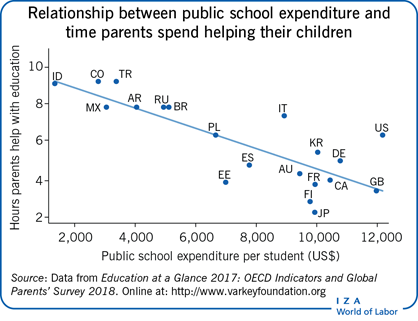Elevator pitch
Many countries around the world are making substantial and increasing public investments in children by providing resources for schooling from early years through to adolescence. Recent research has looked at how parents respond to children’s schooling opportunities, highlighting that public inputs can alternatively encourage or crowd out parental inputs. Most evidence finds that parents reduce their own efforts as schooling improves, dampening the efficiency of government expenditure. Policymakers may thus want to focus government provision on schooling inputs that are less easily substituted.

Key findings
Pros
Parents may respond to changes in public school inputs by adjusting the time and money dedicated to their children’s education, potentially affecting the impacts of public policies on students’ learning.
Parents often reduce their own efforts as schooling improves, suggesting that public and private investments in children are substitutes.
Crowding out of parental inputs is more likely for school inputs that are easily substitutable and observable.
Limited evidence suggests that more-educated parents respond more to changes in school quality than less-educated parents.
Cons
The literature is not in agreement, with some studies presenting contradictory results.
Evidence often focuses on a limited set of inputs from schools and parents, while adjustments may occur across a multitude of dimensions.
Apart from parents, students and teachers will react to changes in school inputs, about which very little is known.
Not enough is known about how parental responses to school inputs impact test scores.